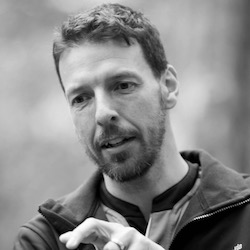
Cheryl Boyd
Global Vice President, Digital Strategies

Motivated to say “Yes!” to God’s call on my life to help fulfill the Great Commission, I was packed and ready to move to a new country with a new team to learn a new language and share the love of Jesus with university students. My response to this call was motivated by my love for Jesus. It felt scary, but it was also exhilarating. Two weeks before our departure, I got a call. “Cheryl, you are being sent to a different location—a different country with people from a different culture and language.” My stomach dropped, and my heart raced. Anxiety and panic threatened to take over.
Change is hard. You are leaving the known and familiar to step out into the unknown, and your normal routines are disrupted. For some, this can be exciting. For others, it feels threatening. Even if you are among those energized by change, I am certain that your tolerance for it has limits.
Change is always harder when it is caused by others' decisions. Most of us have strong opinions about changes that impact our lives, but that does not mean that we always get a chance to give input into those decisions. If we are honest, there are many times when it isn’t practical or possible to influence decisions that lead to change, even if our lives will be significantly affected.
We have a choice about how we respond when change feels imposed on us. I can surrender to God's will, even when I don’t understand it. On the other hand, I can choose to resist it outwardly by stubbornly rebelling or inwardly hardening my heart and becoming detached, refusing to be aligned or participate because things didn’t happen the way we wanted them to.
Sadly, I have been guilty of both of these negative responses. Neither of them pleased the Lord. Those choices eroded trust and discouraged others. Making things right required confession, repentance, and restoration as I eventually realized God’s provision for me was good. His plan is better than the plans I have for myself.
The way of Jesus is the way of the cross. He calls us to a life of surrender, not understanding or agreeing. God is good. His provision and His gifts are perfect. He is my anchor amid the tossing waves of change that threaten to overwhelm me.
I am so glad I reaffirmed that “Yes!” to God’s call on my life 30 years ago. The days that followed stretched me more than I could have imagined. As I followed Jesus throughout those days, He met with me. I experienced a deeper dependence and awareness of His love. I learned more about Him, His heart for the world, and my unique role in the mission. In fact, my staff life has been characterized by this pattern—unexpected change, an invitation, my response, and God’s blessing and provision.
In the past few weeks, we have all experienced change. It isn’t the first time, and it won’t be the last. Our circumstances will constantly change. God will not. He is faithful to every promise. And while He doesn’t change, He is always doing a new thing that leads us to greater fruit and a deeper intimacy with Him.
I encourage you to spend some time with Jesus.
What changes are you experiencing?
How are you responding to this change?
Is your posture one of surrender or rebellion?
Take time to bring your heart to Jesus, surrendering to all He has for you in this new season of life.
Together with you,
Cheryl

Jonah Jala
Global Engagements Lead, Indigitous

Shopping is fun. It increases dopamine released in the brain, giving out that excitement. One helpful tip I do is putting off buying something for a week or more just to test if it would still be as appealing. Only when it stands the test do I buy it.
That's human nature. We change our minds, and when we respond to our surroundings, our needs change as well. I remember playing Pokemon Blue using a diskette around the 2000s. During that time, I would hoard diskettes for my documents. Trying to buy one at this age doesn't make sense anymore. Change is inevitable and constant.
I joined Indigitous nine years ago when we considered starting a community in our country. Six years later, I joined the global team as the engagements lead. In that role, I have learned a lot about navigating changes, especially in the behavior of the people we serve.
Part of my work is finding and engaging those who are interested in living out Indigitous’s values of mission, innovation, collaboration, empowerment, and community. One way we get to do that is through Indigitous #HACK. The global hackathon for missions is an event where people gather to collaborate on missional projects aimed at solving problems affecting their communities.
Since #HACK started in 2016, it has significantly impacted local communities, taking place in over 52 countries and 112 cities and involving over 7,376 participants. In its 8th year, we’re still taking the gospel to new people, places, and spaces, yet we realize we need to change some aspects.
Here are some principles that helped us shape #HACK2024:
Remember your why: To define our why, we dedicated a space to discern and pray. We needed to weigh the costs and align with where we would like to go as we help make disciples.
Empathize with your audience: Seek to deliver value and keep your eyes focused on who you would like to serve. We interviewed and listened to our potential and previous #HACK Champions (those who would like to organize #HACK in their local city) to understand their experiences. We also invited them to dream with us about what would work for them. Bob Bartz from OM once told me, “We are to be students of our target audience.” I couldn’t agree more.
Test, iterate, grow: We set up some new activities, such as the #HACK Champion info sessions that allow people to learn about the commitment before signing up. We initially only had one time slot but shifted to monthly sessions to accommodate our potential champions. The digital space provides a lot of data to help us make decisions. Use your analytics and datasets, create metrics you would care about, and monitor them to put your finger on their pulse.
In all these, I dwell in the assurance that God is sovereign, and even if my assumptions won’t work, He knows the work better than I do. So, I start with my instincts, create a plan, follow the plan, embrace the redirection, humble my heart, and trust the process. The digital space only amplifies how people behave. We’re called to ministry, so it only makes sense that loving people requires us to pursue them through online experiences designed with love. How are you loving your audiences through your designs?

Karl Udy
NAO Digital Strategies Leader

A few cautionary tales are often told about companies that didn’t anticipate the changes that digital technology would bring to their industry. You may have heard Blockbuster Video was offered the opportunity to acquire Netflix but declined because they were earning more in late fees than the total valuation of Netflix. There is now only one Blockbuster store left in the world. Or perhaps you have heard that Kodak invented the digital camera, but they kept the invention in their research and design department for fear of eating into their photographic film revenue. When did you last buy photographic film?
Although both of these examples have a fair deal of hubris attached to them, the reality is that digital technology is changing our world and every field of our societies in the process. The process of an industry or organization being radically upended by new digital technology is called “digital disruption.” We have seen Bible publishing and distribution disrupted by Youversion and education disrupted by Udemy, Coursera, and the Khan Academy. The world of Christian missions is also vulnerable, and if we think that we are immune to digital disruption, then we are prone to the same hubris as Blockbuster and Kodak.
So, what can we do if digital disruption is heading our way?
The most important thing is to prepare for possible digital disruptions. We can do this by innovating with digital technology ourselves. Suppose we can anticipate the potential changes to the field of missions from digital technology and begin to look for the new opportunities and the potential obsolescences that digital technologies may introduce. In that case, we can prepare ourselves to make possible changes to our models and processes to adapt.
We can also do this by holding lightly to our current processes and technology (yes, even Workplace!). They are likely to be superseded by advancing technologies sooner rather than later, and even disruptive technology is vulnerable to being disrupted by new technology.
We must not be afraid of employing disruptive technologies for fear of introducing competition to our established and well-performing strategies. In a world of digital disruption, organizations must be willing to cannibalize their markets.
Finally, in the presence of all of this change and disruption, we may be tempted to compromise our identity. We must maintain a clear understanding of who we are and what we are called to do in the midst of potential chaos. We must keep our eyes fixed on the one who says, “Behold, I make all things new” (Revelation 21:5). Remember that He is also the one who said, “Before Abraham was born, I am” (John 8:58). Digital disruption never takes Him by surprise. He is always faithful, and we can be sure that no situation, even the grave, can keep Him down.


©1994-2022 Cru. All Rights Reserved.